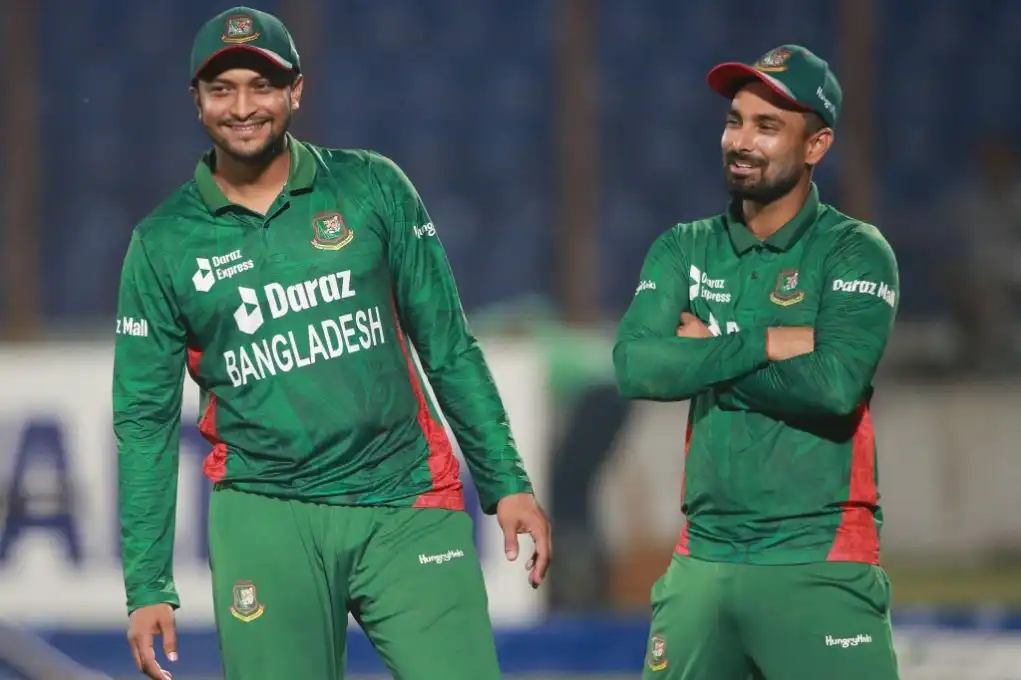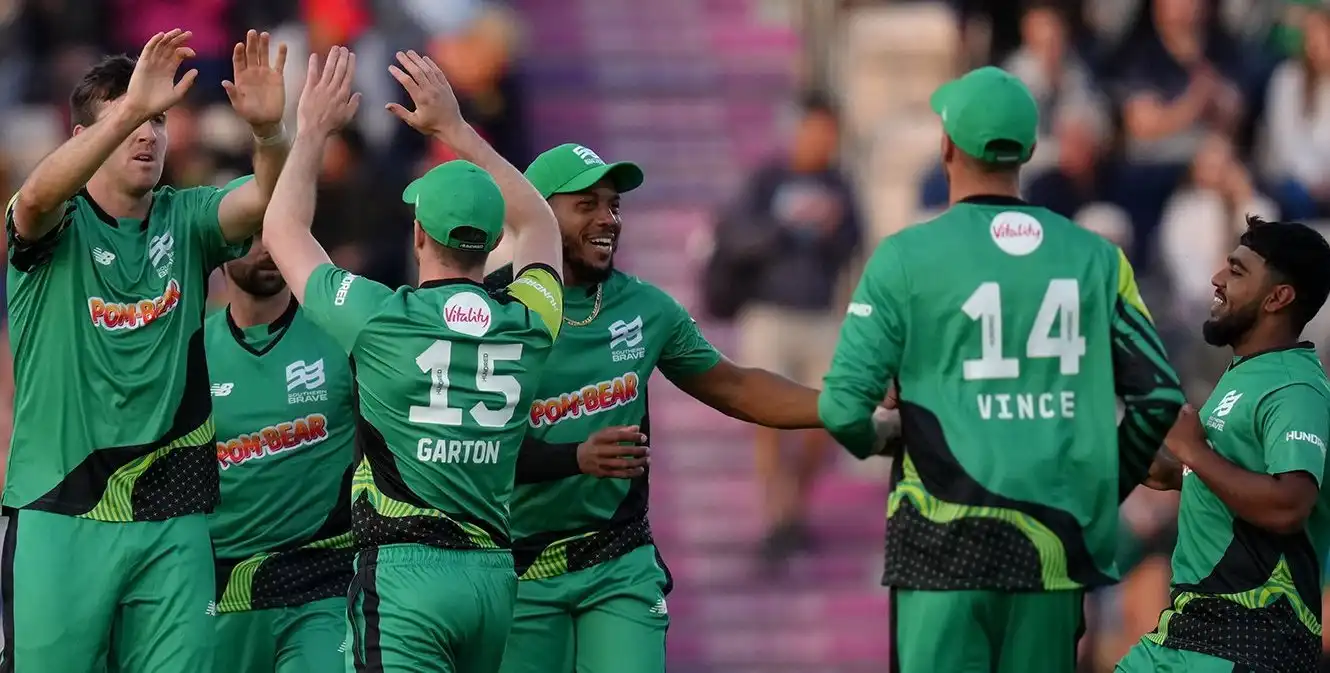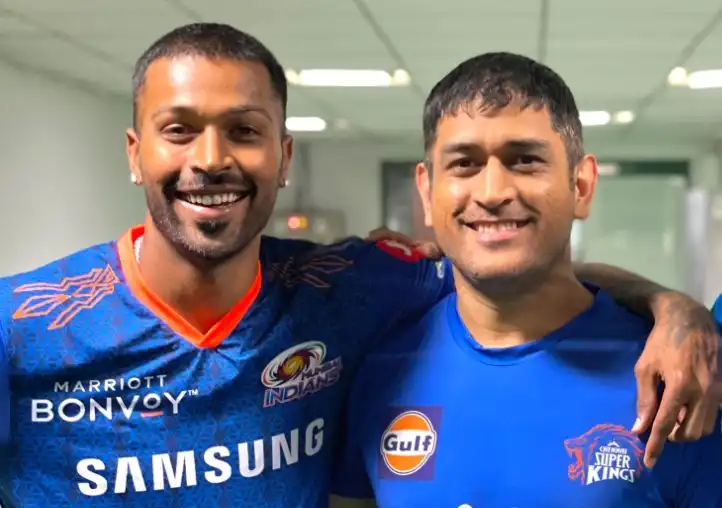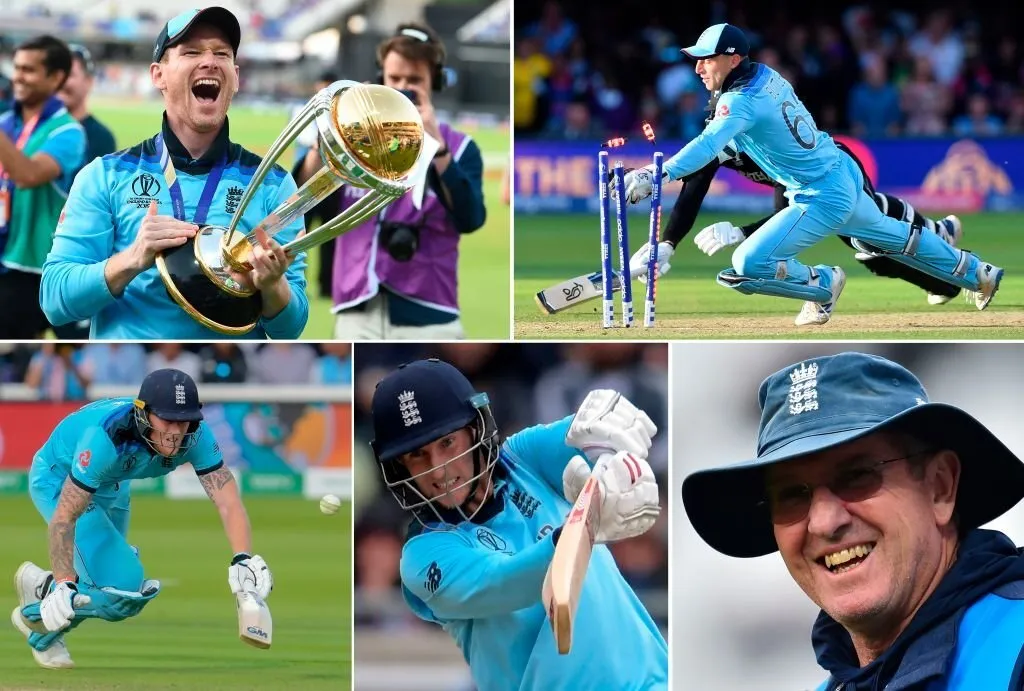 England won the 2019 ODI World Cup under Eoin Morgan (Getty Images)
England won the 2019 ODI World Cup under Eoin Morgan (Getty Images)
The World Cup has been the pinnacle of achievement for cricketers since the moment they began to understand the true nature of the sport. Only the best compete against each other in the World Cup, with the winner taking home the glory. Therefore, there can be no doubt that whoever has the last laugh at the grandest event goes down in history.
But who are the individuals who have enjoyed success ever since the competition’s inception in 1975? Let us take a look at it.
Exploring the Importance of Cricket World Cup Winners List
Fans frequently overlook the accomplishments that nations have made in the past. They begin to judge only based on the current situation. Therefore, it is crucial to have a history book on hand so that everyone can see who dominated the sport during what time period.
Historical Significance of the Cricket World Cup
England hosted the first Cricket World Cup in 1975, and went on to organise the next two editions as well. Under the sponsorship of Prudential plc, a provider of financial services, the first three editions were referred to as the Prudential Cup. 1975 saw the participation of England, New Zealand, India, East Africa, Australia, the West Indies, Pakistan, and Sri Lanka; Canada was replaced by East Africa in 1979. Zimbabwe replaced Canada in the following edition, in 1983.
Each match consisted of 60 overs for a team, and they played with red balls while wearing white uniforms. Furthermore, matches were only held during the day.
Impact of World Cup Victories on Cricketing Nations
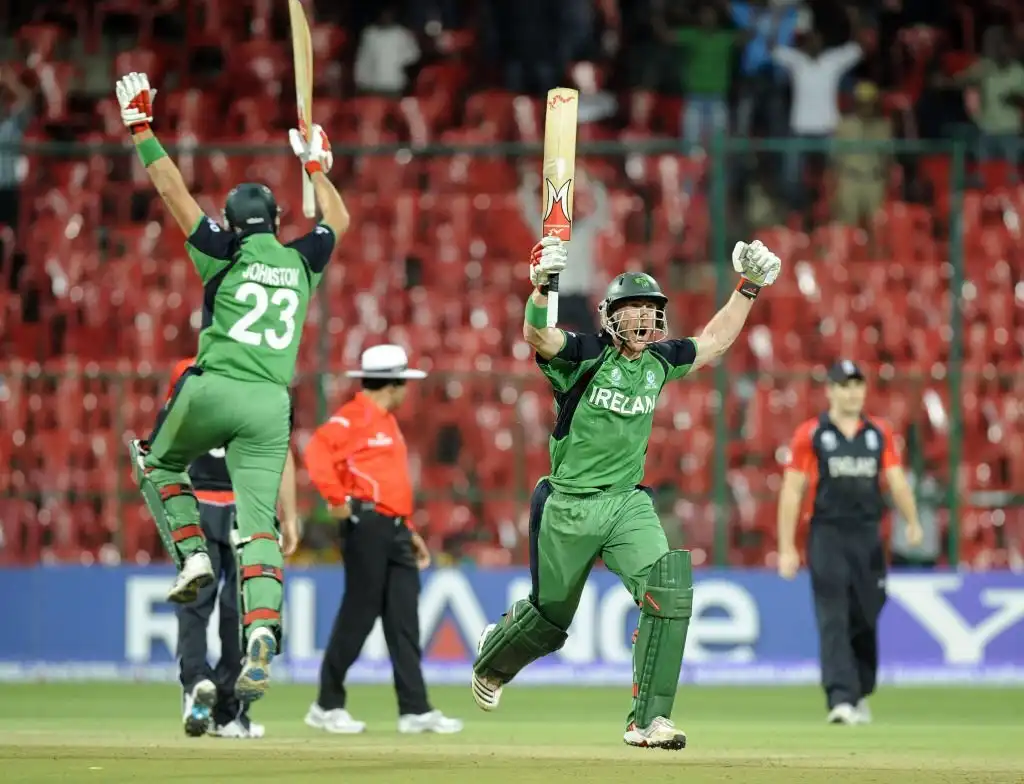 Ireland stunned England by beating them at the 2011 World Cup in Bengaluru (Getty Images)
Ireland stunned England by beating them at the 2011 World Cup in Bengaluru (Getty Images)
Except for the receivers, it feels very tasty when Associate nations stun the world with unexpected victories over cricketing giants. There were several instances in which the unthinkable occurred, the most notable of which was a spirited Indian team defeating then-two-time champions the West Indies in the 1983 World Cup final.
Look at where India has progressed since the victory. Every other country, currently classified as an Associate nation at present, has the capacity to follow suit if they improve themselves and maintain their motivation in the wake of crushing victories over current heavyweights.
Unveiling the Cricket World Cup Winners List
| Year | Hosts | Winners | Runner-ups |
|---|---|---|---|
| 1975 | England | West Indies | Australia |
| 1979 | England | West Indies | England |
| 1983 | England | India | West Indies |
| 1987 | India & Pakistan | Australia | England |
| 1992 | Australia & New Zealand | Pakistan | England |
| 1996 | India & Pakistan | Sri Lanka | Australia |
| 1999 | England | Australia | Pakistan |
| 2003 | South Africa | Australia | India |
| 2007 | West Indies | Australia | Sri Lanka |
| 2011 | India | India | Sri Lanka |
| 2015 | Australia | Australia | New Zealand |
| 2019 | England | England | New Zealand |
| 2023 | India | Australia | India |
Australia has won the ODI World Cup 6 times, making them the most successful nation. Three of them came in consecutive editions, between 1999 and 2007. In this ranking, India and the West Indies are tied for second place, while England, Pakistan, and Sri Lanka have all won once. In the 2023 edition of the World Cup, Australia thrashed India by 6 wickets to clinch the title. Travis Head was adjudged as the Player of the Match.
Journey of Cricket World Cup Champions
If you look at recent World Cup editions, you will notice that the winners were always those who dominated the others before the tournament’s commencement. However, the scenario was entirely different when Kapil Dev’s India stunned the world by securing a famous victory over the Viv Richards-starred West Indies in 1983.
From Inception to the Present
During the 1970s and 1980s, the West Indies were unstoppable, and Clive Lloyd did a fantastic job leading them to win successive editions. After that, Allan Border's Australia achieved success in World Cups, which was quickly followed by Imran Khan's Pakistan and Arjuna Ranatunga's Sri Lanka.
Soon after, Steve Waugh's Australia gained notoriety, and Ricky Ponting ably carried the torch by winning the title in 2003 and 2007. Then, MS Dhoni's India made history by becoming the first team to win the world cup at home. In the following tournaments, Australia and England also accomplished this feat.
Now, India has the opportunity to continue the trend when they host the tournament later this year.
Notable Moments and Triumphs
At the 1999 World Cup, Australia and South Africa tied in a thrilling semifinal match at Edgbaston. Both teams were bowled out for 213, even though simply stating the scores does not fully convey the situation.
Klusener blasted the first two deliveries, bowled by Damien Fleming, to the boundary when he needed nine runs from the final over and had only Allan Donald as company. South Africa failed to cross the finish line, leaving them needing just one run from the remaining balls of the over to secure their place in the Lord's final.
As a result of confusion over a potential game-winning single, Donald and Klusener ended up stuck at the same end of the field when they were run out on the fourth ball of the over. Due to their victory over the same opponents in the Super Sixes, Australia advanced as a result of the outcome. They proceeded to destroy Pakistan in the final to win the title.
The latest edition of the 50-over World Cup in 2023 witnessed the undefeated India against spirited Australian team. India were overwhelmed favourites to clinch their third World title, but Travis Head had some other plans. Chasing 241, Australia won the World Cup rather easily by 6-wickets. Head scored a terrific 137 off 120 deliveries to steer his side to yet another World title.
Celebrating Cricket Excellence: Key Players and Teams
Without Herschelle Gibbs' incredible batting performance, South Africa's massive 221-run victory over the Netherlands in 2007 would not have been as noteworthy. During the group game in Basseterre, Gibbs made cricket history by hitting six sixes in a single over, becoming the first player to do so.
The bowler receiving the record was Daan van Bunge, a leg-spinner who had no defense against Gibbs' repeated attempts to send him over the rope.
It only seemed to make sense that Kevin O'Brien's big shots against England in Bangalore in 2011 would narrow Ireland's loss margin. However, his nation was on the verge of a famous victory over their adversaries by the time he had finished making big shots.
In the Group B match, O'Brien entered the field with his team trailing England's sizable total of 327-8 by 106-4. A stunning display of power hitting ensued. In the 63 deliveries he faced, O'Brien scored 113 runs. He blasted a total of 13 fours and six sixes, leaving England with no chance to counter his aggression. Even though he was not quite able to finish the job, his efforts enabled Ireland—a team that has a history of upsetting the odds at tournaments—to record a famous three-wicket victory.
Reliving Classic ODI World Cup Matches
Wasim Akram scored a quick 33 in Pakistan’s 249-6 total against England in the 1992 World Cup final at the MCG, but that is not the reason why he remembers this game so fondly.
After falling to 69-4 in their reply, England was able to recover thanks to a 72-run fifth-wicket stand between Allan Lamb and Neil Fairbrother. Any possibility of England winning the trophy, however, was dashed by Akram.
In consecutive deliveries, the left-arm seamer dismissed both Lamb and the new batsman, Chris Lewis. Imran Khan, the captain, was able to raise the trophy as Pakistan went on to win the game by 22 runs.
South Africa has never had great luck with the weather during World Cups. When the rules for bad weather conspired against them in 1992, they were denied the chance to advance to the final. They had planned to defeat England in Sydney, but play was delayed and they eventually found themselves needing an impossible 21 from one ball.
The Duckworth-Lewis method was implemented for the 2003 tournament to ensure that the side batting first did not obtain an unfair advantage. The Proteas were the hosts and needed to defeat Sri Lanka in their final group match to advance to the Super Six.
Although a six from Mark Boucher off Muttiah Muralitharan appeared to put them ahead of the requirement, the threat of rain distracted them as they attempted to reach a target of 269 runs. However, they only had 229 on the scoreboard, which is the Duckworth-Lewis method's par total. But Boucher believed that it was sufficient. From the subsequent delivery, the last of the over, he did not score a single run.
Following that, the officials removed the players from the field, leaving South Africa to sit and observe as their hopes for greatness were dashed.
Embracing Diversity: ODI and T20 World Cup Champions
As we already mentioned the ODI World Cup winners above, here's the list of T20 World Cup champions.
| Years | Hosts | Winners | Runners-Ups |
|---|---|---|---|
| 2007 | South Africa | India | Pakistan |
| 2009 | England | Pakistan | Sri Lanka |
| 2010 | West Indies | England | Australia |
| 2012 | Sri Lanka | West Indies | Sri Lanka |
| 2014 | Bangladesh | Sri Lanka | India |
| 2016 | India | West Indies | England |
| 2021 | Oman and UAE | Australia | New Zealand |
| 2022 | Australia | England | Pakistan |
Evolution of Cricket World Cup Formats
The format of the Cricket World Cup has undergone a number of subtle changes over the years. Some adjustments have been made due to a team being added or removed at the last minute, while other adjustments have been made to make the tournament more appealing to the general public.
The first four World Cups featured eight teams, while the third one featured 27 matches and the first only featured 15. The 2015 World Cup had 49 games, up from the previous edition's 15 games, which featured 54 matches.
The number of participating teams has gone from 8 to 16. Due to the 16 teams in the competition and the excessive number of games that were played in the 2007 edition, it was reduced from 16 to 14. The format is constantly changing; it is not set in stone.
Team Profiles: Cricket Legends and World Cup Triumphs
Only two players, Javed Miandad and Sachin Tendulkar, have participated in as many as six World Cups. He participated in the first six iterations of the competition before finally succeeding on his fifth try.
Miandad scored 1,083 runs in 33 games during the World Cup, averaging 43.32, with one century and eight half-centuries. Tendulkar scored 2,278 runs in 45 games, more than 500 runs more than the next player on the list, Ricky Ponting.
Despite his best efforts, Brian Charles Lara, the fourth-highest World Cup run-scorer of all time, was never able to assist West Indies in winning the competition. For the first time since 1983, the West Indies made it to the semifinals thanks to his outstanding century during the 1996 World Cup. They have never made it to the ODI World Cup final four since.
Since Clive Lloyd, only Ricky Ponting has led his team to two World Cup titles. Australia went undefeated in both the 2003 and 2007 World Cups under his leadership. He is the second-highest run-scorer behind Tendulkar and has played more World Cup games than anyone else, including Tendulkar and Javed Miandad, who each played in one more World Cup.
Ponting played 46 games and amassed 1,743 runs at a rate of 45.86, including five centuries and six half-centuries, the second-most after Tendulkar. His brutal attack on the Indian bowlers en route to an unbeaten 140 in the 2003 Final effectively ended the game, despite his strike rate of 79.95.
Insights into Winning Strategies
At World Cup events, there is no better strategy than playing to your strengths. No team has the right to protest this because it is the hosts' right to prepare pitches that work for them. As a result, over the years, every team that played to its strengths won the tournaments.
Every time an associate nation shocks the cricketing titans, it is so obvious that the audience is more affected. Thus, as more teams join forces over time to play the sport, the intensity of the qualifying rounds speaks for itself.
Acknowledging the Unyielding Spirit of World Cup Winners
The ICC honors the player or team upholding the spirit of the game each year with the ICC Spirit of Cricket Award. The ICC Spirit of Cricket Award 2022 was given to Nepalese wicketkeeper Aasif Sheikh for his refusal to run out Andy McBrine after the Irishman tripped while attempting a run. As a result, Aasif became the first Nepalese cricketer to receive the ICC Spirit of Cricket Award.
The ICC Spirit of Cricket Award went to Daryl Mitchell of New Zealand for his gesture during the 2021 ICC Men's T20 World Cup semifinal matchup against England in Abu Dhabi. Mitchell joined Daniel Vettori, Brendon McCullum, and Kane Williamson as the fourth New Zealand player to win the honor. Mitchell received the honor for his decision to forgo taking a single during the intense T20 World Cup semifinal match against England on November 10, 2021, in Abu Dhabi.
Frequently Asked Questions(FAQs)
Cricket World Cup FAQ
Q1: Who has won the most Cricket World Cups?
Answer- Australia has won the most Cricket World Cups, winning the coveted 6 five times in the ODIs. They also won the T20 World Cup last year.
Q2: How many times has India won the Cricket World Cup?
Answer- India won the Cricket World Cup thrice, twice in ODIs (1983 and 2011), and once in T20Is (2007).
Q3: Which teams have consecutively won the Cricket World Cup?
Answer- West Indies won the World Cup consecutively, in 1975 and 1979. Australia achieved the same feat later on, winning the title in 1999, 2003, and 2007.
Q4: Who holds the record for the highest run-scorer in World Cup history?
Answer- Sachin Tendulkar is the highest run-scorer in ODI World Cups, having aggregated 2,278 runs at an average of 56.95. Virat Kohli, who has tallied 1141 runs in 25 innings at a staggering average of 81.50, is the highest run-scorer in T20 World Cups.
Q5: Are there any instances of unexpected underdog victories in the World Cup?
Answer- The 1983 World Cup final, in which Kapil Dev's India stunned high-flying West Indies, is still considered as the most unexpected underdog victory in the World Cup.
Without actually accomplishing it, it is impossible to comprehend the significance of winning the World Cup. The powerful Australians, vicious West Indians, ultra-aggressive English force, and prolific Indians, among others, all dominated for a specific amount of time, and their World Cup triumphs will be remembered for all time.
However, teams that are currently thought of as small will eventually mature with time due to experience and advancement. Therefore, more teams should therefore compete at the grandest stage because doing so will unquestionably aid in their ascent to greater heights.
Being a part of history is always a good thing. There have been so many unforgettable moments in the past, and every player who aspires to represent their country on the field wants to be remembered. Tendulkar had no idea where he would end up when he started playing cricket and eventually rose to the top of the World Cups. So, strive to accomplish everything and do extraordinary things.
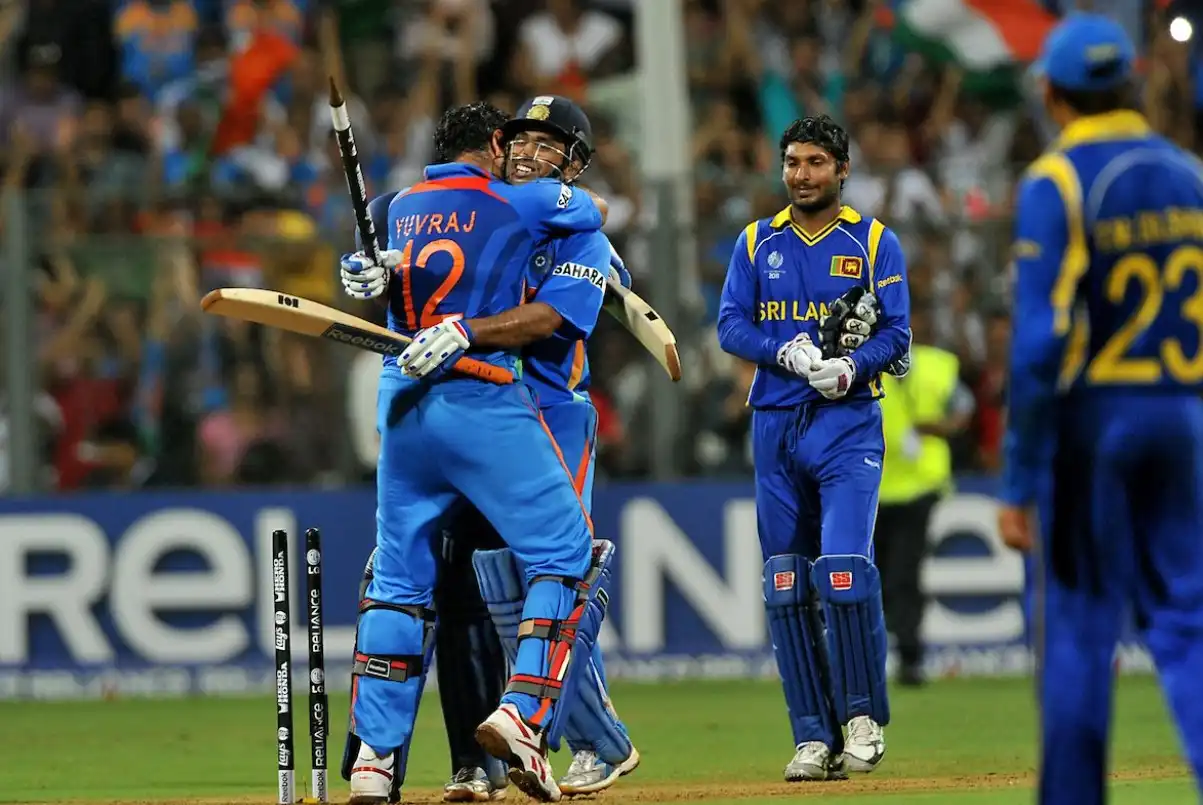
.png)
